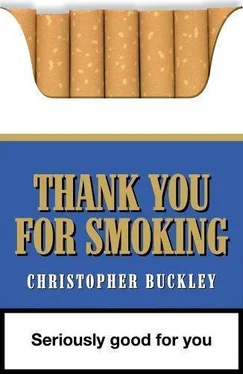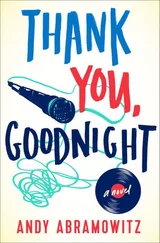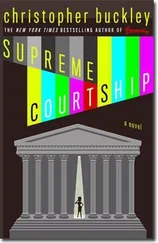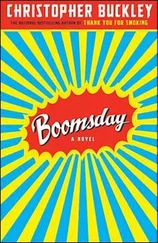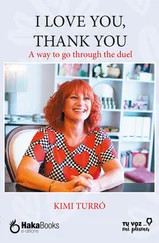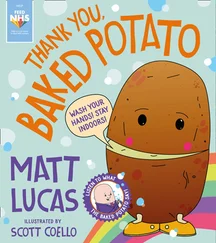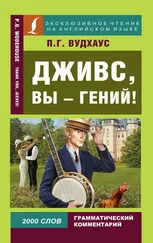"As a matter of fact, we're about to launch a five-million-dollar campaign aimed at persuading kids not to smoke," Nick said, "so I think our money is on the table."
Nick heard the urgent chirruping on his cellular telephone inside his briefcase when he retrieved it from the greenroom in Oprah's studio, but ignored it. He continued to ignore it on the drive to the airport. The cab driver, half-curious, half-annoyed, finally asked him if he was going to answer it. It pleased Nick to know that BR was going through significant agonies on the other end, so he did not pick up. In the waiting lounge at O'Hare, he did, more because people were staring than because he wanted to put BR out of his misery.
"Five million dollars?" It was BR, all right. Nick put his blood pressure at about 180 over 120. "Are you out of your mind?"
"Probably. It's been a very stressful period for me. But I'm feeling much better now."
"Where in the name of God are we supposed to get five million for, for anti-smoking ads?"
"It's not all that much when you think about it. RJR is spending seventy-five million a year on those stupid dick-nosed camels. You'll probably get a lot of good press out of this."
BR was fulminating, making legal threats, saying they were going to put out the story that he was having a nervous breakdown. On and on. It was very satisfying. In the middle of it, Nick heard BR say to someone, "Who? Oh, Jesus." Then he said to Nick, "It's the Captain on line two."
"Give him my regards."
"Stay on the line." Nick stayed on, not because BR had asked him,but to see what the reaction would be from the most powerful man in Tobacco to the news that an upstart executive VP had just committed his industry to spending some serious money to alienate potential customers.
He waited for over ten minutes. They called his flight, but the people at the gate wouldn't let him on while he was using his cellular telephone.
BR came back on. His voice had changed from open bellowing to ice water squirted through clenched teeth. "He wants to see you." "He does?" Nick said. "What about?"
"How the hell should I know," said BR, hanging up with an emphatic klump.
There were no direct flights to Winston-Salem from Chicago, so he had to fly to Raleigh. On the way there the woman sitting next to him, heavyset, in her late fifties, with hair of a color not found in nature, kept staring at him as he read, out of habit, from his clipping file, an article in Science magazine entitled "Scientific Standards in Epidemiologic Studies of the Menace of Daily Life."
"I knowyou," she said accusingly, as if her inability to identify Nick were his fault.
"You do?"
"Uh-huuh. You're on the television."
Nick heard a stirring from the seat behind. What's this? Celebrity in their midst? "Who is it?" "I knew I'd seen him." "It's whatsis-name, from America's Funniest Home Videos." "What would he be doing going to Raleigh? Anyway, he'd be sitting in First Class." "I'm telling you…"
This happened to Nick fairly often.
"Yes," he said quietly to the lady.
"I knew it!" She slapped the issue of Lear's magazine onto her lap. "Studs."
"Yes. That's right."
"Oh! You must have been so humiliated when she said that you kissed like a fish."
"I was," Nick said. "It was hard."
Taking pity on Nick, she shared her own disappointments in love, in particular those pertaining to her second marriage which was apparently failing. Nick was not good at disengaging himself in these situations. After an hour of sympathetic listening, his neck muscles had hypercontracted into steely knots of tension. He would need a session with Dr. Wheat when he got back. He found himself yearning for a terrorist incident. Fortunately, what the pilot announced as a "severe thunderstorm system" moved in and things got so turbulent inside the cabin that the woman forgot her problems of heart, and left deep fingernail impressions on Nick's left forearm. By the time he checked into the hotel it had been a long day and he was too tired to do anything but drink two beers and eat about four hundred dollars' worth of nuts and pretzels from the minibar.
His room service breakfast arrived and with it the morning paper, the Winston-Salem Tar-Intelligencer. He flipped it open and to his surprise saw his picture on the front page, in color, beneath the fold. The headline read:
Fighting Back: Tobacco Spokeman Rips Government "Health" Official For Manipulating Human Tragedy
The article fairly glowed with praise for his "courage" and "willingness to cut through the cant." They'd even managed to get a sympathetic quote from Robin Williger in which he absolved Nick of personal responsibility for his cancer and said that people ought to take more responsibility for their own lives.
The phone rang, and a businesslike woman's voice announced, "Mr. Naylor? Please hold for Mr. Doak Boykin."
The Captain. Nick sat up. But how did they know where he was staying? There were many hotels in Winston-Salem. He waited. Finally a thin voice came on the line.
"Mister Naylor?"
"Yes sir," Nick said tentatively.
"Ah just wanted personally to say, thank you."
"You did?"
"I thought that government fellow was going to have himself a myocardial infarction right there on national television. Splendidly done, sir, splendid. Are you here in town, do I gather?"
It was a sign of the really powerful that they had no idea where they had reached you on the phone. "Would you lunch with me? They do a tolerable lunch at the Club. Is noon convenient? Wonderful," he said, as if Nick, many levels below him on their food chain, had just given him a reason to go on living. They fought a war over slavery, and yet they were so courteous, southerners.
He bought USA Today in the lobby on his way out. He found it in the "Money" section, front page, below the fold:
Tobacco Companies Plan to Spend $5 Million
ON ANTI-SMOKING CAMPAIGN, SPOKESMAN SAYS
He read. BR flailed in a vortex of neither-confirming-nor-denying. While many details remained to be worked out, yes, the Academy had always been "in the front" of concern about underage smoking and was prepared to spend "significant sums" on a public-service campaign. Yadda, yadda. Jeannette was quoted saying that Mr. Naylor, who had made the remarkable assertion on the Oprah Winfrey show, was unavailable for comment: "We're not sure exactly where he is at this point in time." She made it sound like he was in a bar somewhere.
In the cab on the way to the Tobacco Club, Nick reviewed what he knew about Doak Boykin, which wasn't much. Doak — he was said to have changed the spelling from the more plebeian Doke— Boykin was one of the last great men of tobacco, a legend. Self-made, he had started from nothing and ended with everything. Except, evidently, a son. He had seven daughters: Andy, Tommie, Bobbie, Chris, Donnie, Scotty, and Dave, upon whom the burden of her father's frustrated desire for a male heir had perhaps fallen hardest. It was Doak Boykin who had introduced the whole concept of filters after the first articles started to appear in Reader's Digest with titles like "Cancer by the Carton." (The asbestos filter was a particular brainstorm of his, which was now causing Smoot, Hawking many thousands of billable hours in the Liability courts.) As the articles proliferated and the industry found itself in need of a little more presence in Washington, he had founded the Academy of Tobacco Studies to serve, as its charter stated, as "a clearinghouse of scientific information and an impartial and always honest mediator between the concerns and needs of the American public and the tobacco companies."
Читать дальше
